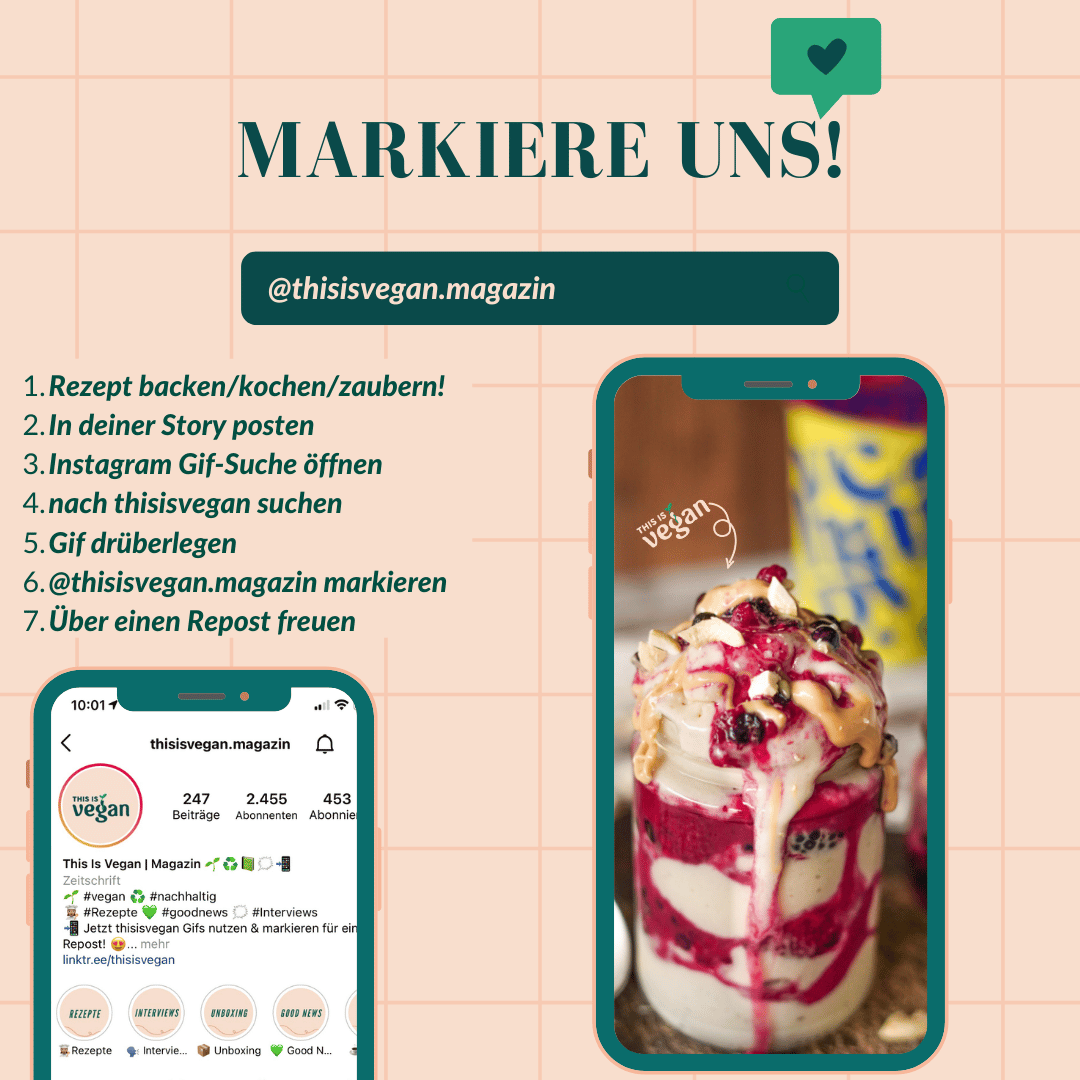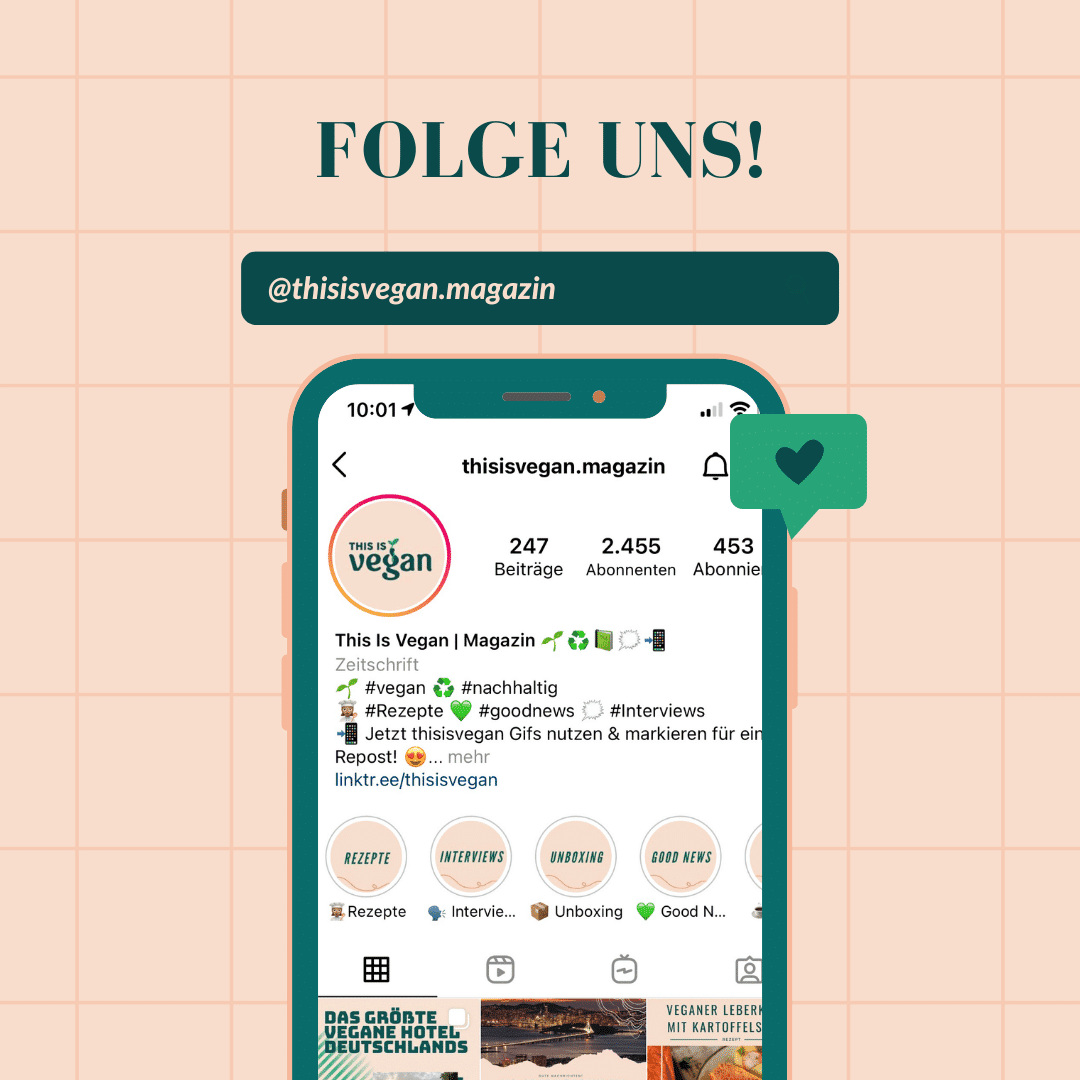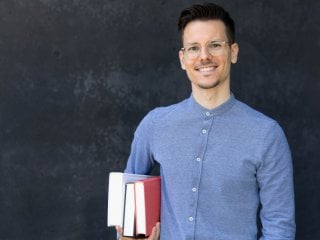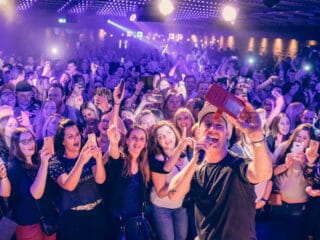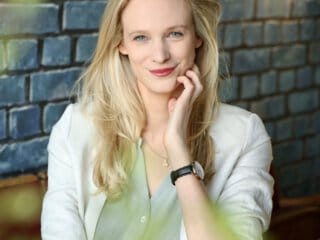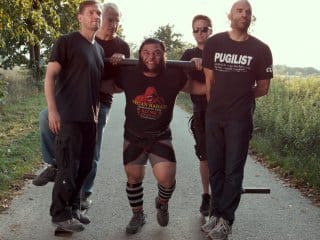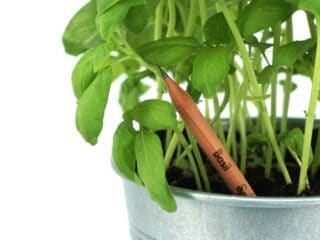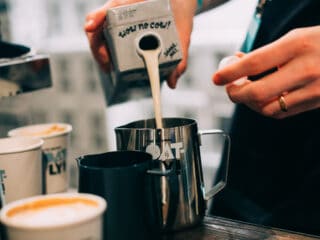Jan Bredack – The VEGANZ founder in interview
- Posted on
- 30 minute read
- Yannick
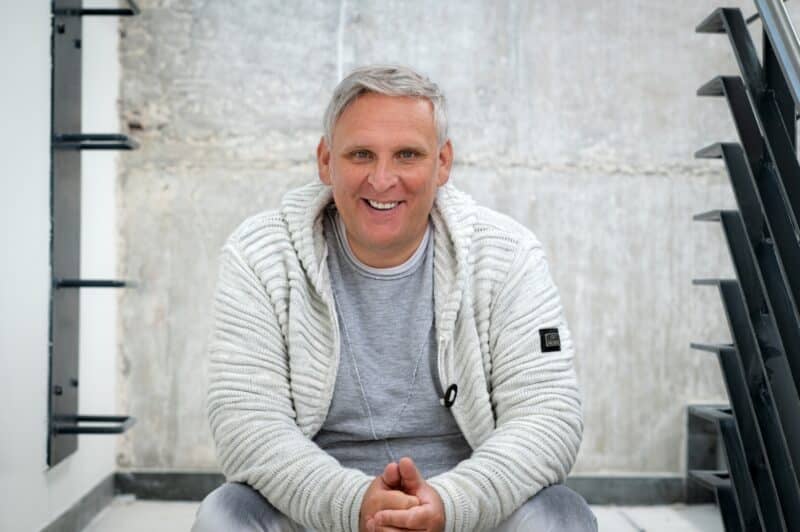
Jan Bredack is born in 1972 in the GDR. After the fall of the Berlin Wall, he began his career in the automotive industry and, after completing his training as an automotive mechanic , passed the master craftsman’s examination. He then joins the Daimler Group and, among other things, sets up and manages the customer service departments for German sales. Jan finally takes at the age of 30 the position as Head of Sales and Service for Commercial Vehicles (Germany). He then moves to the management of the Mercedes Benz Trucks Vostok company as Technical Director. Here, he is responsible for the construction of the first production plant for Mercedes trucks in Russia and for building up the local sales organization. 2008 follows the Burnout, which led him to a radical change of life: He begins to identify with the vegan lifestyle and to change his diet completely to vegan .
In spring 2011, he founded Veganz GmbH, Europe’s first vegan supermarket chain. In 2014 he gets under the Top 3 national finalists at the prestigious German Founder’s Award and becomes Person of the Year in the same year by PETA Deutschland e.V. selected. One year later, Veganz receives the PETA Progress Award for sustainable business. Spurred on by the success of his company, Jan decides in 2015 to launch his own vegan products on the market under the Veganz brand. In 2019, the transformation to Veganz Group AG will follow as the next logical step in the company’s development. From then on, the Veganz brand will focus on the development, marketing and distribution of the currently 120 of its own vegan product creations, available at over 22,000 points of sale in more than half of all EU countries are. With the opening of the first own production facility for vegan cheese alternatives in 2020 in Berlin, he continues to set the Veganz course for growth and is rewarded. Just in time for its 10th anniversary, Veganz 2021 will be the only German company in an exclusive Handelsblatt ranking among the top 3 innovative brands and Germany’s most innovative food brand selected. Within Veganz Group AG, he is responsible for the Sales department in addition to his role as CEO. True to the motto “Eat something for the climate”, Jan Bredack is continuously working on sustainable innovations and is one of the mentors of the ProVeg Incubators.
We have Jan Bredack to the detailed interview (online) met and intensively with him about the food market, the IPO, his motives to live vegan and the plantbased revolution exchanged.
At PLANTBASED. Podcast with VEGANZ founder Jan Bredack you will learn:
- What Vegan 5.0 means for the food industry
- How he created a platform that enables Veganz to produce revolutionary vegan products
- Why Veganz is not actively addressing the issue of “in-vitro meat” for the time being
- Which soccer stadiums have Veganz products and how vegan artists influence the offer
- Why Veganz founded and why they went public
- How they managed to abolish an outdated law that prohibited the government from investing in vegan production facilities
If you’d like to hear the full interview, click hereto listen in on the PLANTBASED podcast .
Have fun with it!
In Germany and beyond, you are known like a colorful dog, but for those who do not know you yet, please introduce yourself briefly.
Jan Bredack: “Bunter Hund” appeals to me. I’m Jan Bredack, I just turned 50, which actually gave me a deep blow. I would not have expected that. I’m married with seven children – don’t be alarmed, this has built up over the last 30 years with three wives and the burdens are well distributed and I refute the prejudice that vegans are impotent, which I’ve also heard many times. Fun! 😀
I founded Veganz in 2011 and we have now had a wild ride and are now Listed on the stock exchange since last yearwhich is not always good, as we are learning right now, but I am very optimistic that we can play a significant role in influencing and shaping the plant-based revolution here, at least in Europe.
"On the one hand, I've always considered myself very fond of animals; on the other hand, I've been digging into the thick steaks at night. And I could not resolve this contradiction so easily and then decided very consistently on 1.1.2009 to live purely plant-based."
Jan Bredack
Why do you live vegan?
Jan Bredack: By now, it’s a very diverse smorgasbord of arguments, but my original entry was actually ethical reasons. So the impulse came from my second wife, who was vegetarian. I didn’t think about it at all, but then through the confrontation with the topics of “Why don’t people actually eat meat?” I got there very quickly: On the one hand, I’ve always considered myself very fond of animals, on the other hand, I’ve been digging into the thick steaks in the evenings. And I could not resolve this contradiction so easily and then decided very consistently on 1.1.2009 to live purely vegetable. And subsequently, many, many reasons were added, and in the meantime, my significantly dominant reason is actually climate and environmental protection. And I believe that this is a reason that many people are not yet familiar with, and it is not at all clear to most people what food, and above all plant-based food, has to do with climate and environmental protection.
You have yes also to the topic suitably the Veganz nourishing study* accomplished last year. What were the key results?
Jan Bredack: It also always depends on which country you’re looking at, but it’s mainly animal welfare, but the topic of climate and environmental protection has already taken number 2 and number 3 after the question: “Why do you eat vegan?”
But what was much more decisive for me in these studies – not only in ours, but also in others – is, that the proportion of flexitarians is increasing exorbitantly, especially in our target group. And when I say “target group,” I mean the age group in particular, which is really from 15 to 34. We now see a Ashare of flexitarians of around 60% and that is of course a hefty figure in Germany.
In other countries, this is already more pronounced. Overall, we’re at 30%, which I don’t think is bad at all, because vegetarians are, I think, around 10%, 12% in Germany, and flexitarians – you might have to clarify the definition – are around 30%. Also flexitarians are not those who accidentally eat vegetables as a side dish during the week, but who really make a very conscious decision once or twice a week to swap animal products for plant-based alternatives. That is so the conceptualization of the flexitarian. And who also have good reasons for this, either health-related, and especially among flexitarians very pronounced is the issue of climate and environment.
You also have many convenience products on offer. Often one then gets the reproach of the "chemistry set". How do you invalidate that?
Jan Bredack: The best way to do this is to take a look at the ingredient lists together, take them apart and compare them with those of animal products. And most of them, from what I see, don’t even know what they’ve been shoveling in there every day for decades – their parents, their grandparents. It’s just become so conditioned, so lived, so normal. And the plant-based alternatives were certainly also rightly criticized at the beginning for chemistry sets. That was so, whereby animal ones are in no way inferior to it, but in the meantime – and I can also claim this for us -. We have arrived at Vegan 4.0, Vegan 5.0 and it is really about using as little as possible, with only natural ingredients, which also have a low impact on climate or environmental destruction, preferably none at all, and biodiversity. – so putting the whole mix into a bouquet and then getting a product that is highly attractive in terms of taste is actually the challenge for Vegan 4.0 and 5.0. And all those who do not comply with this may be successful in the short term because they have a good-tasting product on the market, but they will not be successful on the market in the long term because this is becoming increasingly important, especially in the young target group.
It is questioned: Where does this come from? How is this grown? What substances are in there? What costs are allocated there? And and. There is so much questioning. And brands that resist this will no longer be relevant tomorrow.
"Meanwhile [...] we have arrived at Vegan 4.0, Vegan 5.0 and there it is really about using as little as possible, with only natural ingredients that also have a low impact on climate or environmental destruction, preferably none at all, and biodiversity."
Jan Bredack
How can you imagine a process of a Veganz product that is created in your head until it ends up in the supermarket?
Jan Bredack: That varies. Meanwhile, Veganz is a platform.
We’ve really established ourselves as a platform, meaning we offer young, even older, tinkerers, food scientists, or someone who had a good idea, a docking point, so to speak, for their ideas. A lot of people come to us, some of whom have really cool ideas, but who would never manage to handle the whole process – product development, quality, production, packaging, marketing and, above all, sustainable sales and placement in the supermarkets – on their own. And that’s why we provide a docking point for these people. And since we basically have so many products and our machine is running yes and we can dump in such a good idea at the front and then in the process the finished product comes out at the back. And the tüfler, the tinkerer, they still participate in the success as if it were their product. We then turn those affected into participants, and thus our machine is constantly overfed with an extremely large number of innovative products. We can’t process everything we get on the table. This is a fly-in lane.
The second comes from our own people, where we always have in the lead up to three years a pipeline. There are always 30 or 40 products that are being developed, where production machines are now being adapted to them, where entire production processes are being rethought. And that can take three quarters of a year in some cases, due to the current situation it’s more like two years, because you don’t get machines, you don’t get machinists, you don’t get electronics, you don’t get programmers. So there is a shortage at every point right now. At the moment, we are trying to manage the shortage somehow in order to generate enough output for our brand, for our products, in the end. So that’s sort of the second way.
And the third, there is also, but it is rather rare that we buy a company or that a smaller company offers itself to us and says, “I’m not getting anywhere here. Can you help me?” And then there are different ways to integrate that with us.
These are the three ways in which such a product is created. But what we can do, and we are certainly very unique on the market in this respect, is that we really do everything from research development, i.e. research, where we have a lot of cooperation with universities, with Fraunhofer, with whoever, right through to sales marketing, really the fight for homes on site, and not just in Germany, but also in many countries around the world. And that is unique, because not many have such a value chain, such depth, especially in our segment.
Future topic In-Vitro Meat! Have you already researched this, or are you working on it?
Jan Bredack: No, In vitro meat actually not, because it is not a vegan product in the conventional definition. And we have not only upheld plant products because they are ethical, moral climate, environment, but also animal welfare, but also health – and meat remains meat, whether it is in vitro or not. You then have less impact on climate and environment, but health aspects. Therefore, we still do not see animal protein. We’re not cheering, but I still think it’s a good way for companies to get involved, because it takes the biggest chunk off the plate when it comes to climate and environmental protection. There it is mega. When it comes to animal welfare, it’s not so mega yet.
How did the cooperation with the Red Bull Arena in Leipzig come about and where else can we encounter VEGANZ in the future?
Jan Bredack: Yeah, cool. I have noticed that our stadium is now also being used for concerts, which is of course great for the visibility of our brand and products. You will find us now for the concert season also for example in Cologne. Tote Hosen and Ärzte play there, and that’s where it came about, for example, because there are some vegan artists there and they say, “We’ll only play here if you also have a vegan offer.” And in no time at all, thanks to our cooperation with Aramark, which manages this stadium, they knock on our door and say, “We have concerts here. We need vegan stuff. Can you help us?”
And that’s not quite how it went with RB (Red Bull Arena). RB was born out of a desire to cooperate with Borussia Dortmund. They had invited me, I looked at it and I didn’t think it was cool. I’m not a soccer fan anyway, and this mass of people, the bawling – it was just too much for me. That’s when I said, “We don’t fit in there as a brand.” But this appointment at Dortmund has turned into an appointment at Leipzig. Then I was at Leipzig in the stadium. That was completely a different world. Families, children, grandparents – this was folk festival, and many women. So Leipzig has, I think, also with over 40% the highest proportion of women in the stadium. And that was more like it. We come from the East, RB is a startup, we are a startup and one thing led to another and then we had a cooperation agreement. And from the outside, many think we are now sponsor at RB Leipzig. We are, but we are also business partner, and there is still a lot to come in the next few months. We have a lot planned for the stadium.
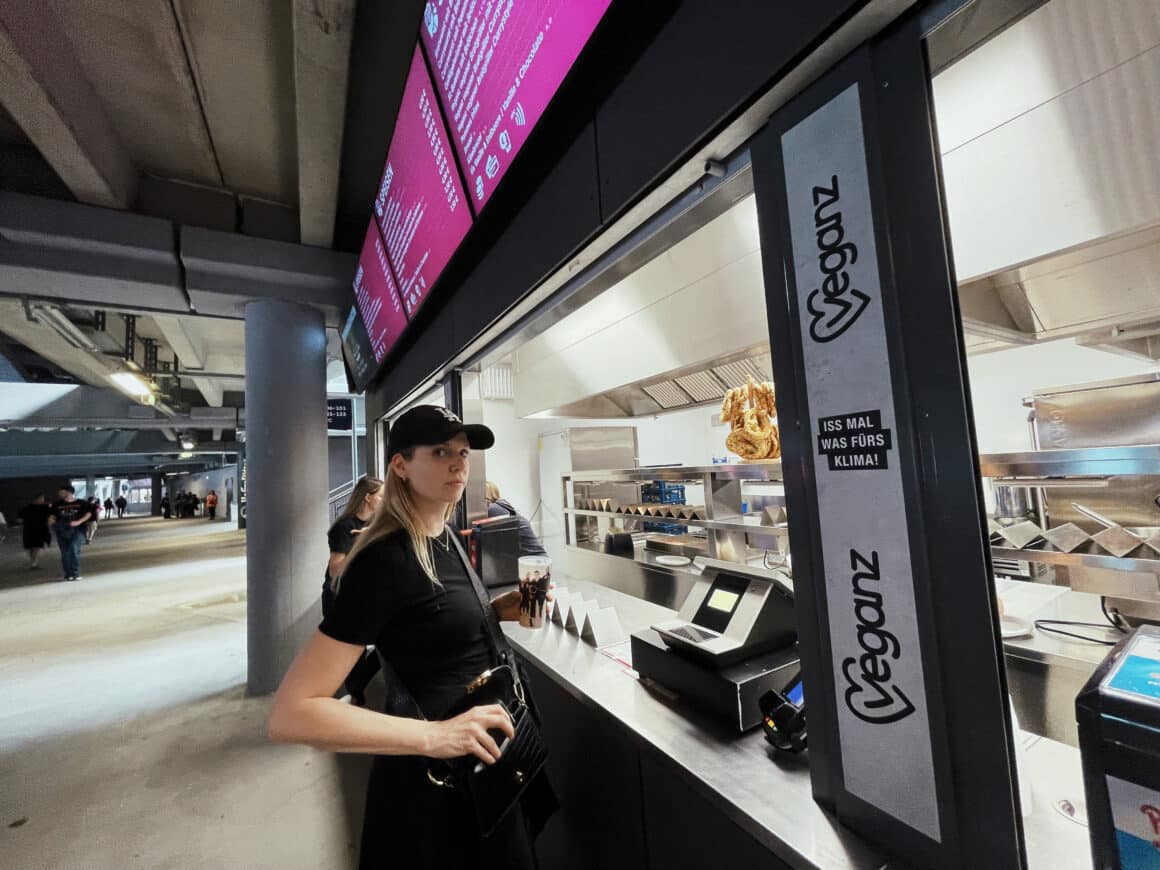
How do the sterotype soccer & metal fans react to vegan sausages?
Jan Bredack: We are also at the festival in Wacken, because Aramark is also a partner there. Sure, I’ve just tied it to soccer now. Exactly, but this hardcore fan scene, as I experienced in Dortmund, for example – there were once twice as many people there. 80,000 versus 40,000. That slayed me and there was more of the “normal” fan, as you know him so stereotypically. And in Leipzig I rather really like a folk festival experienced, so extremely many children, small children – you probably won’t have seen them at a Rammstein concert – who then consumed gummy bears, cookies – and we have all that – and with their grandparents, with their parents, families, couples, groups. And this extreme hardcore fan scene doesn’t exist in Leipzig and that was a good breeding ground for us. And so far, I have to say, this partnership is bearing extreme fruit, even into the team, whether it’s the professional soccer , the women’s team, whether it’s the e-gaming scene , which is very strong in Leipzig in the championships, et cetera. So we have already gained good access and can place our brand and our products there in a great way.
Where are your products available in other stages?
Jan Bredack:
- Our sausages are now available at VfB Stuttgart in the stadium.
- We are close to making a cooperation with VfL Wolfsburg as well.
- Cologne I had already told you.
- In Bavaria we also had talks, but that failed because of the different ideas, because we are not the classic sponsor who wants to be on the board. This is not our game, we want to go to the kiosk. We want to be the alternative to the bratwurst, to the schnitzel. Of course we pay money for it in the end, but we also get money, but we are not the classic sponsor who just wants to clap his hands on the board. That makes no sense at all for us and that’s why it didn’t work with Bayern.
- Hoffenheim didn’t work either, but just the others mentioned.
- I believe we are also still in talks with Gladbach .
By the way, there was not only interest from Germany, but also from other countries, especially from the UK, where it is already common practice that vegan companies have conquered the stadiums – Korn with Liverpool. You can get Korn products all over the stadium. I think they’re completely switching to vegetarian now. So there’s a trend there, too.
Then you're a real game changer in Germany.
Jan Bredack: Definitely. So as far as that is concerned, we were certainly pioneers, who also tackled it properly for the first time. I know, Rügenwalder was in Dortmund also with such a small sign on the gang, but in the stadium not to have, except in the VIP lounge and also only in the break. In a product in a wrap inside there was that then and not labeled at all. I found this out by asking. So rather very defensive, but we went into the full and that has more than paid off for us already.
You're seeing it more and more on social media. Everyone posts their vegan stadium sausage.
Jan Bredack: And the good thing perhaps as a supplement: The VEGANZ stadium sausage – I don’t know if you could eat the latest model there yet, but it’s already very authentic and will be available in stores shortly.
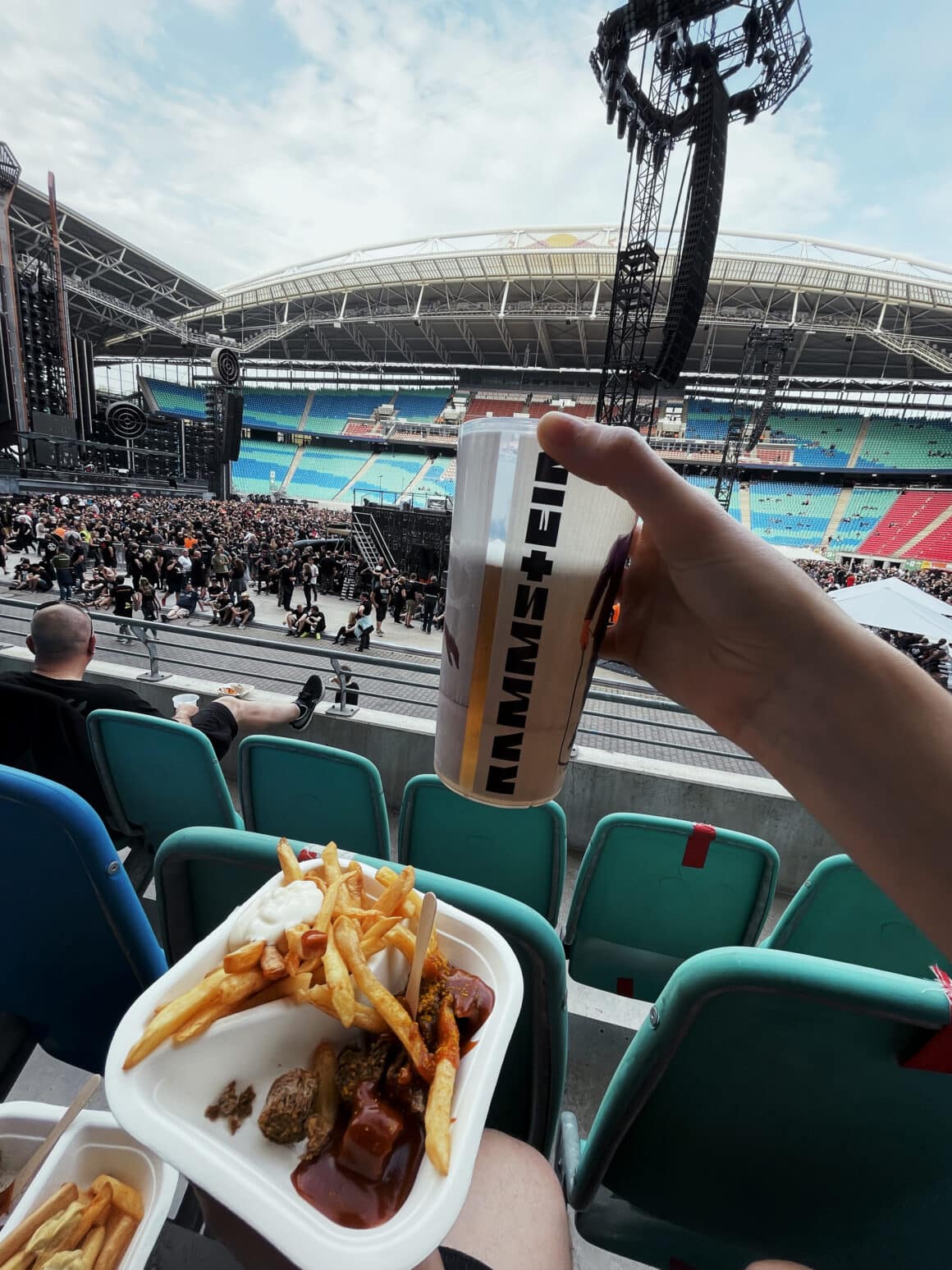
"Then at the concert or soccer game, you stand at the kiosk and get a vegan alternative for the same price of the conventional sausage. And then one of them says, "Come on, I'll try this." And there you go, you have a test, a tasting."
Jan Bredack
Okay, for those who want to try them: I can definitely recommend them. Was very, very tasty.
Jan Bredack: Yes, exactly, now comes the conclusion: In the stadium, where the people who are not vegan, also have not thought about becoming vegan, they drink a beer, meet with their friends, are at the concert and then stand at the kiosk and get for the same price of the conventional sausage a vegan alternative. And then one or the other says, “Come on, I’ll try this.” And already you have a test, a tasting, which you can never achieve like this in the store, because you have your shopping habits. You usually always reach for the same thing. And there we suddenly break down a barrier, because through this experience of biting into it and saying, “That tastes good“, we catcht them. So then we have already achieved everything we wanted.
Exactly, just trying something new and by the fact that you also branded it, you already have the association with the brand automatically and then you think to yourself in the supermarket, "I already tried that."
Jan Bredack: Otherwise it won’t work. So only vegan sausage would be a bit little now, that’s true.
What was it like for you when you switched to vegan? Was there anything that you incredibly missed?
Jan Bredack: Exactly, the trigger, why I opened at all also the first vegan supermarket – I opened quasi for myself, because I found nothing. It was very difficult. You had to gather everything everywhere.
I had to gather everything together in health food stores, in organic markets, etc. and it was very time-consuming. And above all, buy online. And that’s when I said, “No, come on, there’s got to be a place to put all this stuff in one place.” And that’s how the idea of the supermarket came about, which I actually made significantly for myself alone.
Convenient that you could buy "cheap" from yourself from then on, right?
Jan Bredack: “Cheap” I don’t know, but the bottom line is that it’s very expensive shopping when I look at what I’ve burned in years at Veganz in money. But it’s because I just had this belief, it must be possible to bring everything together in one place. And I didn’t think back then about making a whole chain out of it, or now making Veganz what it is today. That wasn’t in my head at all at the time, but it was really very egoistically driven. After all, I was still at Daimler at the time. “Come on, I’m building my own supermarket now.“
That means you were at Daimler before and then made the switch to a vegan supermarket. How did it come about?
Jan Bredack: Exactly, I was at Daimler, was in Russia at the time, built a plant there and set up sales, and at the same time set up the first supermarket in Berlin and was always flying back and forth. And then at some point the supermarket opened and there was a huge wave – really, people were knocking down our doors. And then I suddenly came under pressure, because the idea of somehow doing that in parallel became: “I have to decide now.”
Yes, we are all happy about the decision.
Jan Bredack: Yes, but this one wasn’t always easy, but I’m also glad of course. With it I got to know life again from a completely different perspectivebecause when you’re embedded in a company like that, even though you’re a senior executive and certainly under pressure and also with a lot of challenges, it’s still something else to set up your own business, to stand on your own two feet, to build a company like that, even to drive it completely to the wall, take command back, start over again and so on. Those were already very formative experiences, which I would not want to miss today.
Now the thing is that you guys are relatively big now - as I said earlier, the IPO and so on. I've read about some people on the internet accusing you guys of sellout because of this. How do you answer them?
Jan Bredack: So you know, we were at a threshold. The theme: To realize our visions, you need a lot of money. And we were standing on the threshold: Do we now throw ourselves at a great strategist or do we somehow try to finance ourselves further on our own? With the amounts we need for construction production and everything I told you earlier to keep the machines running, 10 million is not enough, nor is 20 million. You need more money than that. And then, in fact, the IPO was the only option left for us or a very attractive one, because many use the IPO as an exit. Then the theme as a founder is, “I’ve done it. I’ve now sold my company and goodbye.” For me, it was the other way around. I took advantage of the IPO, even bought, mI committed myself not to sell anything the next few years. So it’s really been a financing case for us and also with the funds we can now make many things possible at all, which were never possible before, and now we can play along with the big ones at all. And I don’t want to say “annoy them” at all, but the bottom line is that we can use the realization of our vision to set some bigger signs there in the food industry already.
Exactly, and as you say, that takes money.
Jan Bredack: Far from Sellout. Far away from it. So that doesn’t fit at all. In my terminology, I don’t know that at all.
Now, not only do you have massive amounts of products that are sustainable, but you also pay attention to the eco-balance when it comes to packaging. How do you implement this in the meantime?
Jan Bredack: We first made our value chains transparent in the first place. This made us the absolute aliens in the food industry, because in the food industry in particular, people tend to keep things behind closed doors and create as little transparency as possible. We did exactly the opposite. We disclosed everything transparently, measured ourselves, said to ourselves, “Okay, where are we good? Where are we bad?” And indeed, not all of our products were good in terms of carbon footprint, eco-balance, et cetera. And then we started to work with this transparency on our sourcing, on our issues, which are obvious there: CO2 et cetera or soy from the rainforest. Or other things: Palm oil – where does that come from? Very few people question that. And so we have given ourselves an internal measuring instrument, so to speak, with which we challenge ourselves every day. And all the products we make have to go through that and have to prove themselves. And even if they are already on the market, they have to be optimized in that respect, because that’s what we say everywhere: Everything we do has to have a positive impact on the climate and the environment, otherwise we won’t do it. So just because a product tastes awesome or looks good or smells good – that’s not the criterion for us as to why we bring a product to market.
"Everything we do has to have a positive impact on climate and the environment, or we won't do it."
Jan Bredack
On the net there are some reports around your new products, like the "vegan egg". What else can we expect from VEGANZ in the future?
Jan Bredack: Yes, the vegan egg has now gone through the roof in communication. To be honest, I didn’t expect that at all, because we actually have other products in the pipeline that are much more sensational from my point of view, whether it’s a salmon or in the fish sector in general, where we are working very hard with algae and making things from algae. Marine cultures are the future for me anyway. That’s where we’re headed, that’s where we’re doing a lot of research, that’s where we’re investing a lot. That’s where the music plays. An egg like that – you know, it’s totally fancy, no one’s done it before, we’re just setting up production for it. By the way, this came out of such a cooperation that I told you earlier. There was a tinkerer who had applied for a patent and said, “I can’t deal with this at all. I don’t come from that field. Can you do this?” And we took a look at it, said, “Yes, we can get this ready for series production,” and started working on it, and are now on the verge of having a machine park that will ultimately produce it. But we have now launched a vegan Snickers. There’s some great stuff coming in the confectionery area, too. Those are the most successful things anyway. If you can reproduce conventionally popular, well-known products, such as Snickers, Mars, Bounty, etc., so well in vegan form and also achieve such a perfect ecological footprint with less sugar, a good carbon footprint, no animal products, etc., with more protein, then you actually have all the trump cards in your hand. And that’s exactly what we’re doing right now.
You have won one award after the other. You're PETA's Person of the Year, you've been nominated by EY as Entrepreneur of the Year, Founder of the Year, and on and on. For some people, I'm sure you're also a source of inspiration. But are there also people who inspire you, or do you have role models?
Jan Bredack: I am often asked this question. So I’m very selective. First, I actually focus on my vision and on my environment. I had a lot of companions who inspired me. This is, for example, Götz Werner, who accompanied me as a sponsor for three years through the Founders’ Prize. In 2014, we won Götz Werner as a sponsor there. That was very, very inspiring for me, because Götz Werner was already an absolute pioneer during my studies on the subject of leadership, management, co-entrepreneurship. Unfortunately, he died this year.
In fact, someone once gave me a Book given by Elon Musk and said: “You, I read the book and thought of you the whole time.” Then I read it myself and said, “Okay, he’s right in facets, but in terms of leadership culture, for example, I’m a completely different person.” I’m not a patriarch, I’m not one to yell at people or impose my opinion, but quite the opposite. I try to get people to take responsibility and motivate them to make their own decisions, which is also very difficult because people are no longer used to it and don’t know that they can, should, must make their own decisions as employees in our company. We always notice that when new people start working for us. This is so the first big challenge and change they may encounter to their previous working life. And there are indeed some who are overwhelmed by this because they say, “I do need my boss to whom I can delegate my responsibility, who makes the decision for me,” but that is not the case with us.
No, that's the easier way, but not necessarily the right way.
Jan Bredack: That’s easier, exactly, and then it’s also always about: Who was to blame when a decision went wrong? A quite ugly error culture and from it arise in the companies also so fears. And out of these fears then arises a work culture, leadership culture, we don’t have that. And that’s very difficult to develop and maintain, because new people are always joining and everyone brings their own little package and contributes it. And you need the mass of people who then carry them along and give them the confidence: “Here you can be like this. Here you can be like this.” But still, everyone is an individual and has his strengths, his weaknesses and needs his own environment, where he feels comfortable in. And I learned how to do that from Götz Werner and that has been a great inspiration for me .
"Elon Musk [...] is a visionary, and even from the outside you might think he's a little crazy. That's what some people say about me, so I can understand that. He thinks things around the corner not just once, but sometimes twice, three times, and overcomes resistance. And that's a quality that's sort of innate in me."
Jan Bredack
And I also think it's important to be able to let off steam creatively and to be able to express yourself. Dealing with employees in this way is exactly the right way to go.
Jan Bredack: Elon Musk is not doing that right now, but Elon Musk is doing other things. He is a visionary and you might also think from the outside that he is a bit crazy . Some people say that about me, too, so I can understand that, but he doesn’t just think things through once, but sometimes twice, three times, and then also goes over resistance, overcomes resistance. And that’s a quality that’s practically innate in me. That’s what I did at Daimler, that’s what I did as a kid, and that’s what I do now in my working life. So there is resistance, but I don’t perceive it as such, or it’s more of a challenge.
While you're on the subject of resistance, I'm sure there are some lobbying groups coming up to you every day and knocking on your door saying, "We don't want you to push the veggie revolution." Were there any things in the last years where you had to swallow so hard that you said: "I'm quitting everything now"?
Jan Bredack: No, there was no such thing. So lobby actually there was this time, but it’s long gone. That was in 2013, 2014, at the very beginning of Veganz. Today it’s rather the other way around. Today, lobbying associations are formed, which also invite me, but there it’s about enablers plantbased. And there aren’t that many entrepreneurial types in our country who embody that, and that’s why they often end up with me, and then I also see the same people on these boards over and over again. So you meet again and again, because the field is very thinly spread with entrepreneurial types and people who really stand up for it in public. There are some in the background and there is a lot going on, but what Lobby needs is a bit of publicity. There are few – very few, in fact.
Yes, unfortunately, but you are one of those who have positioned themselves relatively well, or are doing a lot, of course, accordingly. What path would you like to take with Veganz in the future in terms of marketing activities?
Jan Bredack: Marketing is rather secondary for us – we have our purpose, why we exist. That’s climate and environmental protection, and that’s where individual promotions jump from. There’s a whole bouquet of flowers. I can’t even tell you everything, so that’s insane.
It is always important to me that our story, that our purpose remains clearly recognizable and that it is also seen and that it is also valued and that it increasingly crystallizes: Okay, they stand for climate and environmental protection, that’s why it’s like this. These connections are not immediately obvious. This is a very long and difficult road. What I can say we accomplished – you say we were loud. I don’t think we were that loud, because we never had the funds to make any real noise, but we managed to be the best-known brand in the DACH region in the plant-based sector.
We also constantly measure our brand awareness in comparison to others that are now appearing on the horizon, and we are by far the most popular as well as the most innovative and best-known brand. And on the one hand, that’s a total honor, but on the other hand, it’s also a burden, because now, of course, everyone is looking as an indicator for an entire movement: How are they performing? What are they doing? And if you now take our share price, which has collapsed like many others, people take that and say: “Oh, look, I always knew that“, and there is so much ridicule and malice.
But this is what one of our investors just told me last week from the IPO: “You have such a big responsibility to an entire industry. Be aware of that.” And I’m aware of it, but the fact that it’s now seen that way from the outside as well is stark. And that shows once again: This has nothing to do with making noise. It’s just through our history, through what we’ve achieved so far through products, through awards, whatever, the whole smorgasbord, an image has emerged that we’re taken to be emblematic of this plant-based category. And everything that goes wrong or well with it is also blamed on us. And that is not always easy.
Yes, I can well imagine that. Meanwhile also the policy jumps on it, and/or we have even vegan Members of the Bundestag, who give there really full throttle, therefore I am also optimistic that there in the future still much, much more in the direction will happen.
Jan Bredack: I’m on a number of committees and my experiences – I don’t want to go into all the details now, because many of them are closed jobs, but I’d have to dampen your euphoria and expectations a bit, because unfortunately politics is running behind reality at the moment. So people, civilization, society is much further along than politicians are willing to compromise, to make decisions, to set a course. And due to the constellation as we have it right now – due to the coalition – one partner, who has the color green, is certainly very up front and very combative, but the other two are rather behind. Especially those who are not red tend to be brakemen in the relationship. Especially in the relationship where we are on the road. And that drives the green politicians to despair.
I can well imagine that. How do you think the middle of society can deal with this, or what can be done to make politicians aware of it?
Jan Bredack: Well, we do that through our committee work and we point out the grievances on an ongoing basis. There is so much. That’s where I can really talk out of the sewing box. I will tell you one because it affected us ourselves. There was a law from 1987 that forbade that factories, production plants for vegetable milk and cheese alternatives could be promoted on the part of the government.* There was a real ban in the law and that existed until this year January, February, because we fought against it. At the time, I called Altmaier – I really went to the barricades, because we are building such a production facility, and for me it was completely incomprehensible how these politicians stand up front and say: “We are for climate and environmental protection and want to support everything”, and on the other hand they don’t manage to scribble such an old amendment out of the law. I thought that was already an indictment, and there are umpteen of those intertwined in laws, regulations that are rather counterproductive to what we are doing right now.
More information can be found at Vegconomist and the open letter can be found here.
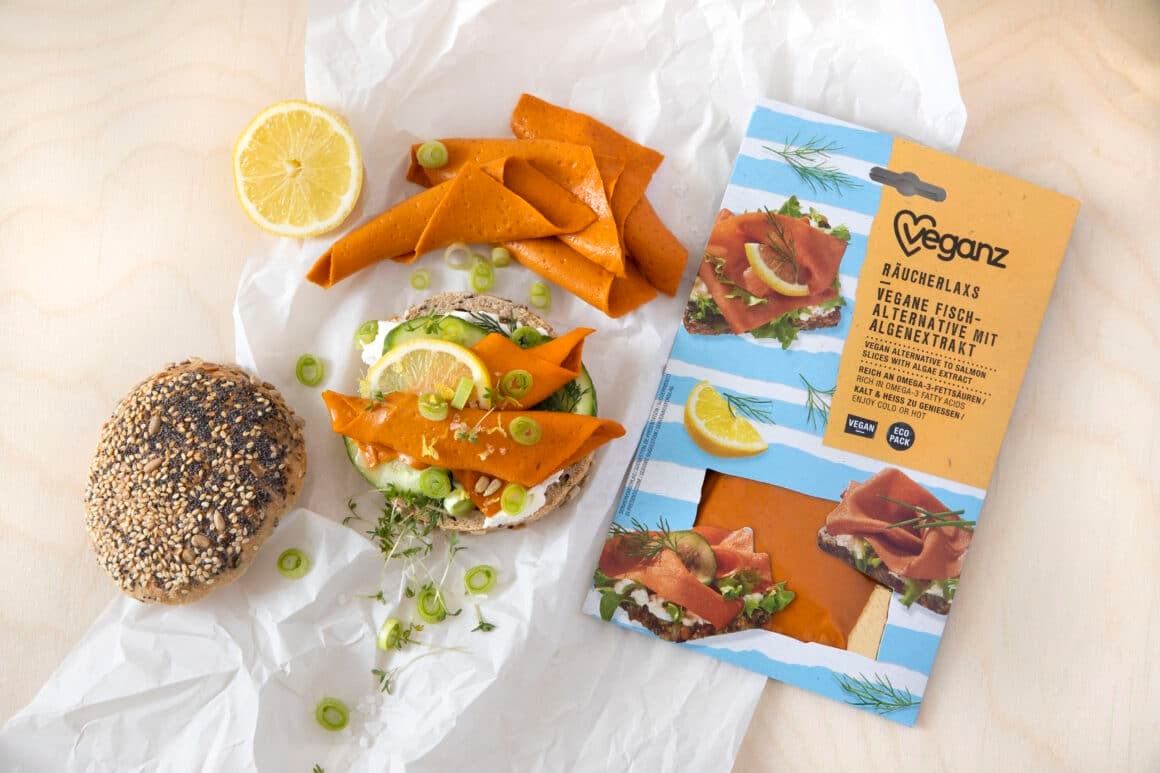
Okay, then you've curbed my euphoria a bit. Nevertheless, I am optimistic about the future. Jan, we've already pretty much reached the end. At the end, why don't you give us a few motivating words, or what would you like to say at the end?
Jan Bredack: Yes, when I look at the current times, it is extremely difficult for companies, even like ours. Sure, I understand that too, because the priorities of societies have shifted for the time being. There are fears of war, you look: “Oh God, what’s happening here?”, we suddenly have tanks in Europe virtually on our doorstep, very bad scenarios, and I simply wish people would have a healthy degree of self-reflection and optimismI’m not just looking at Germany, because I firmly believe that these societies – and I’m not talking about politics here, because I’ve just said something about that – can generate an enormous amount of energy and power from movements like this, which can even reverse and stop the climate- and environmentally-destructive trends that we’ve had for decades. But unfortunately, man is such that he always needs a real shot across the bow before he starts to rethink there.
But you asked me for the positive. I am an optimist of purpose, I firmly believe that there is this power in the companies and especially – now I am 50 myself – The young generation has a lot of visionary thinking and a lot of energy to tackle these issues. And politics tends to be a hindrance here, because it’s still yesterday’s news. That’s not what you expected, but it’s what describes a little bit of the reality in which I’m moving.
Here are the VEGANZ products:
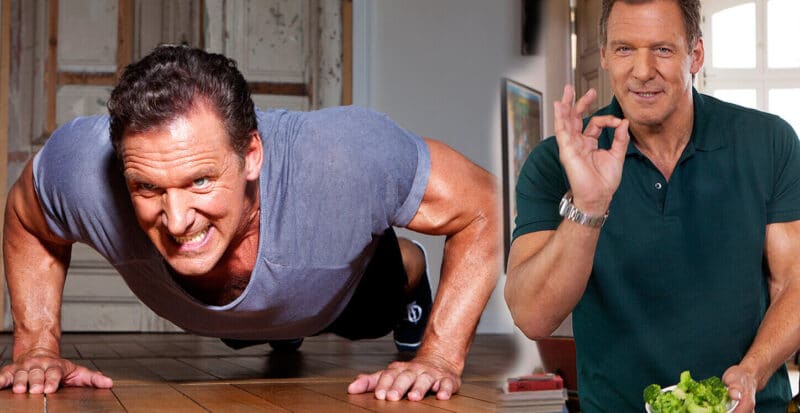
The vegan gladiator in the interview: Ralf Moeller reveals his secret recipe for a 60 biceps
You want to support the work of This Is Vegan?
On our pages you will find so-called affiliate links. When you buy your favorite products through them, we receive a commission, which automatically supports us.
About the purchase of sustainable reusable cups from us you support the Gnadenhof Papillon or Sea Shepherd.
Alternatively, you can follow us here on Instagram on Pinterest or here on Linkedin , listen to our podcast , subscribe to and rate or support us directly here:
Danke. 🙏🏽💚
Yannick
Nächster Artikel
Niko Rittenau about myths around vegan nutrition
- Posted on
- Yannick
Empathy in the belly – Oli P. on vegan nutrition, animal welfare and sustainability
- Posted on
- Yannick
Vegan nutrition against the Corona virus – Dr. med. Petra Bracht in the interview
- Posted on
- Yannick
Veganuary! CEO Ria Rehberg about new records at vegan month 2023
- Posted on
- Yannick
Vegan is unhealthy?! Gordon Prox on the future, his start-up and family
- Posted on
- Yannick
Vegan athletes: Top 10 athletes & their plant-based diet
- Posted on
- Daniel Köhler
Pens to plant! – Interview with Sprout World founder Michael Stausholm
- Posted on
- Yannick
The Hype Around Oat Milk – The Oatly Germany CEOs in Interview
- Posted on
- Yannick







